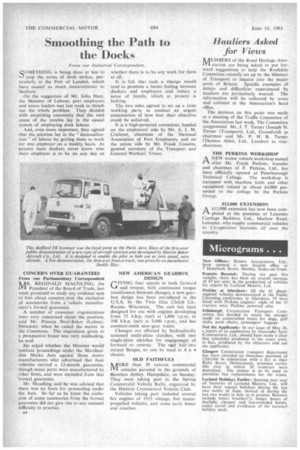Smoothing the Path to the Docks
Page 38

If you've noticed an error in this article please click here to report it so we can fix it.
From our lndmstrial Corres-pondent.
QOMETH1NCi is being done at last to *--) stop the series of dock strikes, particularly in the Port of London, which have caused so much inconvenience to hauliers.
On the suggestion of Mr. John Hare, the Minister of Labour, port employers and union leaders met last week to thrash out the whole problem. They decided with surprising unanimity that the root cause of the trouble lay in the casual system of employing dock labour.
And, even more important, they agreed that the solution lay in the " decasualization of labour by getting them to work for one employer on a weekly basis. At present most dockers never know who their employer is to be on any day or
CONCERN OVER GUARANTEES From our Parliamentary Correspondent .1\4
R. REGINALD MAUDLING, the President of the Board of Trade, last week promised to study any evidence sent to him about concern over the exclusion of accessories from a vehicle manufacturer's formal guarantee.
A number of consumer organizations were very concerned about the, position, said Mr. Francis Noel-Baker (Labour, Swindon), when he raised the matter in the Commons. The impression given to a prospective buyer was very misleading, he said. He asked whether the Minister would institute proceedings under the Merchandise Marks Acts against those motor manufacturers who advertised that their vehicles carried a 12-month guarantee, though many parts were manufactured by other firms, and were excluded from that formal guarantee. Mr. Maudling said he was advised that there was no basis for proceeding under the Acts. So far as he knew the exclusion of some accessories from the formal guarantee did not give rise to any unusual difficulty in practice.
B4 whether there is to be any work for them at all.
It is felt that such a change would tend to promote a better feeling between dockers and employers and induce a sense of loyalty which at present is lacking.
The •two sides agreed to set up a joint working party to conduct an urgent examination of how best their objective could be achieved.
It is a high-powered committee, headed on the employers' side by Mr. A. J. M. Crichton, chairman of the National Association of Port Employers, and on the union side by Mr. Frank Cousins, general secretary of the Transport and General Workers' Union.
NEW AMERICAN GEARBOX DESIGN
GIVING four speeds in both forward and reverse, with continuous torque transference between changes, a new gearbox design has been introduced in the U.S.A. by the Twin Disc Clutch Co., Racine, Wisconsin. The unit has been designed for use with engines developing from 75 b.h.p. (net) at 1,800 r.p.m. to 108 b.h.p. (net) at 3,090 r.p.m., and has constant-mesh spur-gear trains.
Changes are effected by hydraulically actuated multi-plate clutches, with two single-plate clutches for engagement of forward or reverse. The twit has two output flanges, so can be used in 4 x 4 chassis.
NiTORE than 30 veteran commercial vehicles paraded in the grounds of Beaulieu Abbey. Hampshire, on Sunday. They were taking part in the Spring Commercial Vehicle Rally. organized by the Historic Commercial Vehicle Club. Vehicles taking part included several fire engines of 1915 vintage, five steampropelled vehicles, and some early buses and coaches.




















































































































